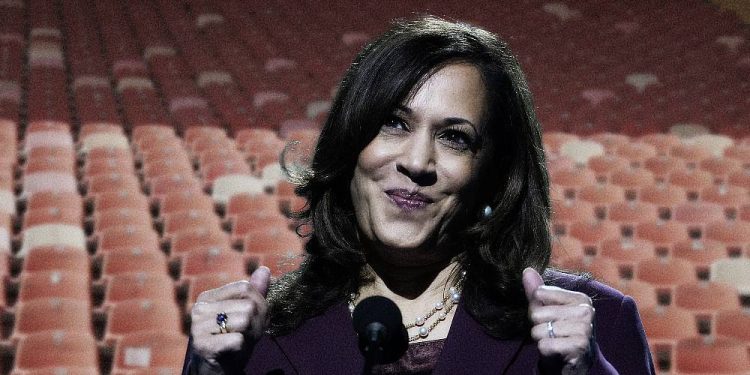Editor’s Note: The article was originally titled “DNC Begins Virtual Roll Call to Formally Nominate Harris for President.” We adjusted the title to highlight the two most important points which were missed in the article.
First and foremost, the need for a virtual roll call has already been made obsolete. The three states that had deadlines ahead of the Democrat National Convention have all made pathways for the party to put their nominee on the ballot. Second, it’s noteworthy that Kamala Harris has not received a single vote from a Democrat during a primary. Considering her lack of popularity before Joe Biden abandoned the nomination, it seems nearly impossible for her to have earned the nomination from Democrat voters if a fair and open primary process was observed. With that said, here’s Jacob Burg from The Epoch Times…
The Democratic National Committee (DNC) began its early vote on Aug. 1 to formally nominate Vice President Kamala Harris for president, keeping to an earlier promise to hold a virtual roll call ahead of the party’s convention.
The DNC opened the vote at 9 a.m., allowing delegates to email back a personalized and watermarked form or cast their vote by phone. The committee is sending the ballots on a rolling basis in a process that will likely take several days until the voting window closes at 6 p.m. on Aug. 5.
The Democratic National Convention is scheduled for Aug. 19–22 in Chicago.
Harris is the only candidate eligible to receive delegate votes after no others qualified by the July 30 deadline. She already submitted signatures from 3,923 delegates who have pledged their support, according to a DNC statement, making up 84 percent of the full delegation. She needs to secure a majority of delegates, 1,976, to become the official presidential nominee of the Democratic Party.
A vote cast for anyone but Harris during the roll call will be counted as “present.”
The “virtual roll call” will cement Harris at the top of the Democratic ticket by Aug. 5, making sure the party secures ballot access in all 50 states with deadlines looming.
Dealing With Deadlines
Democrats previously expressed concern about deadlines in Ohio, Washington, and Alabama that required campaigns to file paperwork to be listed on the general election ballot before the formal nomination process could take place at the Democratic National Convention.
Ohio and Alabama changed their filing deadlines from Aug. 7 and Aug. 15, respectively, to Aug. 23 and Sept. 1 to adjust for the scheduling of the nominating convention. Washington state officials did not change the state’s Aug. 20 filing deadline, but the state’s director of elections agreed to accept a provisional certificate to allow the nominee onto the ballot.
Deadlines in the states of Montana, Oklahoma, Virginia, and California fall in the same week as the convention.
The virtual nominating process is similar to one used to tally roll call votes in the 2020 convention during the COVID-19 pandemic, when the party nominated Biden remotely.
Harris would become the first black woman to be nominated for president in U.S. history. She also identifies as Asian American, as her mother, Shyamala Gopalan, is an immigrant from India.
The DNC formalized its rules for the roll call and the 2024 convention on July 24.
“The Convention in Chicago will be a critical moment for our party—not only to rally around our nominees and showcase their bold platform for the next four years—but to bring delegates to the table to vote on our Party’s platform and conduct a ceremonial state-by-state roll call that has long been a beloved tradition of our Party,” Democratic National Convention Committee Chair Minyon Moore said in a statement at the time.
The official nominee will be selected by Aug. 7. At that point, the nominee will name a running mate, although Harris has said she will do that ahead of a campaign stop in Philadelphia on Aug. 6.
Her vice presidential shortlist includes Pennsylvania Gov. Josh Shapiro, Sen. Mark Kelly (D-Ariz.), Kentucky Gov. Andy Beshear, Minnesota Gov. Tim Walz, and Secretary of Transportation Pete Buttigieg.
The Associated Press contributed to this report.
What Would You Do If Pharmacies Couldn’t Provide You With Crucial Medications or Antibiotics?
The medication supply chain from China and India is more fragile than ever since Covid. The US is not equipped to handle our pharmaceutical needs. We’ve already seen shortages with antibiotics and other medications in recent months and pharmaceutical challenges are becoming more frequent today.
Our partners at Jase Medical offer a simple solution for Americans to be prepared in case things go south. Their “Jase Case” gives Americans emergency antibiotics they can store away while their “Jase Daily” offers a wide array of prescription drugs to treat the ailments most common to Americans.
They do this through a process that embraces medical freedom. Their secure online form allows board-certified physicians to prescribe the needed drugs. They are then delivered directly to the customer from their pharmacy network. The physicians are available to answer treatment related questions.





